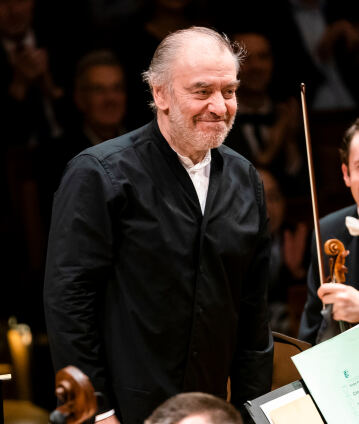Valery Gergiev conducts Stravinsky’s “Firebird”

Music based on three colourful Russian fairytales are to be heard in this concert with Valerie Gergiev: the bloodthirsty story of The Golden Cockerel set to music by Nikolai Rimsky-Korsakov, excerpts from Prokofiev’s humorous and charming ballet Cinderella, and from Stravinsky, his iridescent, energetic Firebird. The concert opens with another magical, but very different work: Debussy’s Prélude a l’après-midi d’un faune.
Valery Gergiev is a man obsessed with music who rushes inexorably from one project to the next and gives no quarter standing up for his cause: exemplary performances whose drama is characterised by thrilling tempos and a well-differentiated orchestral sound. The winner of the Herbert von Karajan conducting competition and former assistant to Yuri Temirkanov raised the venerable Mariinsky Theatre to new heights and became one of the most internationally sought-after orchestral conductors of his generation: “What is important,” said the incumbent chief conductor of the Munich Philharmonic, “is how much passion you have, and how big the emotions are, your fantasy worlds and your imagination. Because without them you cannot inspire. Your artistic nature should be exceptionally diverse, so that as a conductor you can captivate orchestra and audience.” In the Berlin Philharmonie, Valery Gergiev presents a sophisticated programme which opens with Claude Debussy’s Prélude à lʼaprès-midi dʼun faune. In this multi-coloured, iridescent orchestral piece based on one of Stéphane Mallarmé’s most famous poems, an arabesque-like melody from the flute shapes the musical scene, with sounds of horns and antique cymbals enriching the iridescent sounds with ever new facets.
This is followed by excerpts from Sergei Prokofiev’s Cinderella, which Aram Khachaturian enthusiastically called a “delightful, fantastic fairy tale dance,” that would enter the “eternal repertoire of classical Russian ballet music”. In Cinderella, in Prokofiev’s words “the fairy tale world” plays a key role: “The atmosphere of magic surrounding the fairy godmother, the twelve fantastic dwarfs that pop out of the clock as it strikes twelve in a chechotka (a stomping Russian dance) to remind Cinderella to return home; the swift succession of different countries the prince travels to in search of Cinderella; the lively, poetic breath of nature personified by the four fairies – the seasons of spring, summer, autumn and winter – and their companions”. The extremely sophisticatedly orchestrated suite from Nikolai Rimsky-Korsakov’s Pushkin opera The Golden Cockerel and the no less sophisticatedly orchestrated ballet L’Oiseau de feu also take their inspiration from fairy tales. Together with him, Igor Stravinsky created fascinatingly plastic and in its essence danceable music for the Ballets Russes which is completely in the tradition of the Russian magic fairy tale opera.
© 2018 Berlin Phil Media GmbH
Related interviews
Artists
Our recommendations
- Hélène Grimaud and Valery Gergiev
- A “Russian Evening” with Valery Gergiev and Denis Matsuev
- François-Xavier Roth and Isabelle Faust
- “Carmen” with Simon Rattle, Magdalena Kožená and Jonas Kaufmann
- Emmanuelle Haïm conducts Handel’s “Music for the Royal Fireworks”
- David Zinman conducts Beethoven and the “Neruda Songs” by Peter Lieberson